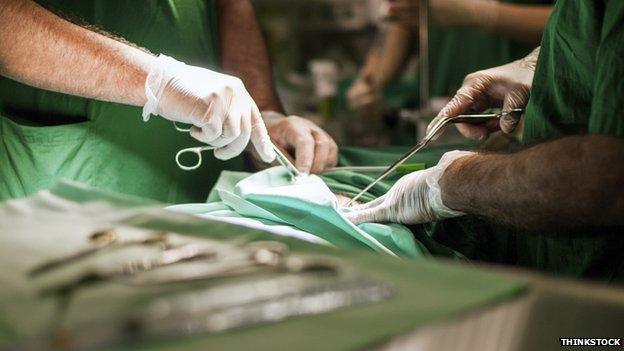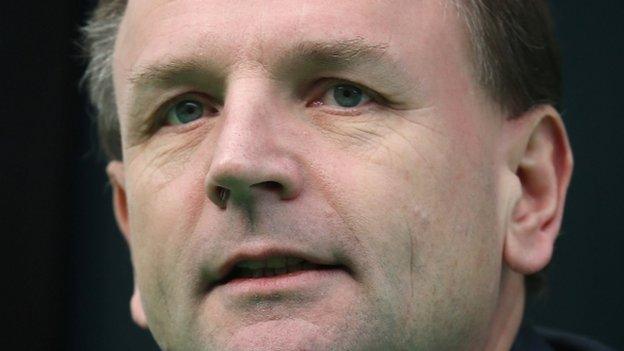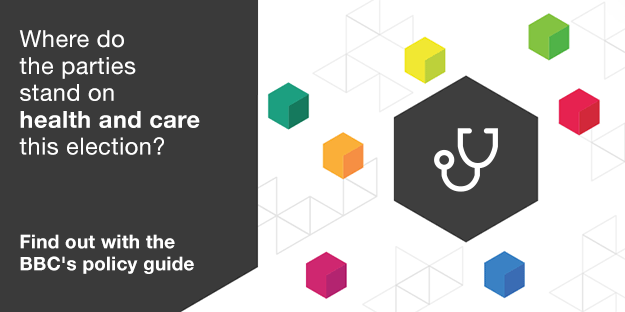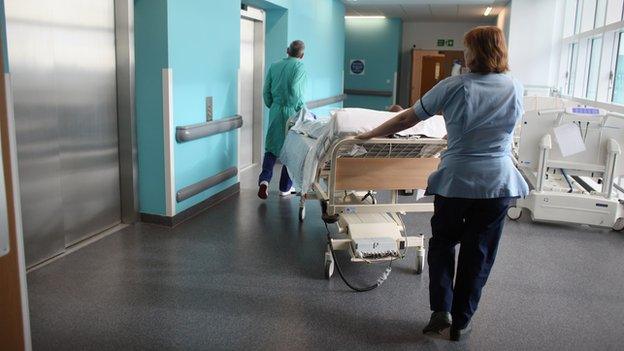Who will pay for the Stevens NHS plan?
- Published

The NHS needs significant new investment its boss says
Following the election campaign like everyone else is Simon Stevens, head of NHS England.
The one thing he really wants to know is whether whoever forms the next government will stump up the cash he asked for at the end of the parliament.
The future of the NHS featured prominently in the televised leaders' debate on Thursday, but so far there has been a certain amount of ambiguity from the major parties about whether they will commit to the extra funding which NHS chiefs believe is necessary to keep the service on an even keel.
Cast your mind back to last October when Simon Stevens unveiled his 'Five Year View', external for the NHS in England.
The document, agreed with regulators and major health organisations, was widely acclaimed.
Mr Stevens, only six months into the job, predicted that by 2020 there would be a gap between anticipated demand for health care in England and what the NHS was able to provide with an inflation-proofed budget.
That gap, he said, would be around £30bn.
Efficient ways of working
Much of the 'Five Year View' focussed on how the NHS would work differently to keep people healthier and out of hospital if possible.
A more joined-up approach between primary and acute care providers would mean a more effective use of resources.

Simon Stevens wants to keep people out of hospital
He argued, backed by the health sector regulators, that £22bn of the gap could be dealt with by efficiency savings and new ways of working.
That was a highly ambitious target but it still left £8bn which the head of NHS England said should be provided by the government.
The Stevens plan quickly achieved cross-party support.
The NHS seemed to be signing up to a degree of heavy lifting and was not demanding a blank cheque.
George Osborne was impressed with the Stevens approach and soon afterwards agreed to find £2bn extra for the NHS in England for the 2015/16 financial year.
Across the party divide heads were nodded with approval when the Simon Stevens blueprint , externalwas mentioned.
There was a tacit acceptance of the 'Five Year View'.
Lack of commitments
So where are we now with Simon Stevens' request for an extra £8bn of annual funding for the NHS by 2020?
The only major party to commit to that extra spending is the Liberal Democrats.
Nick Clegg reaffirmed that on the first full day of the campaign while arguing that a certain amount would be earmarked for mental health.

New drugs and treatments can be costly
But funding (in the shape of tax measures) for only £1bn of that has been identified by the Lib Dems.
The rest will come from "the proceeds of economic growth" - in other words the funding is subject to the economy expanding sufficiently to provide sufficient tax revenue.
Labour has not, so far, signed up to the £8bn of extra annual funding in 2020.
The party has promised £2.5bn extra per year for the NHS, paid for by the mansion tax and other revenue-raising measures.
When I interviewed Ed Miliband in January he stopped short of endorsing the Stevens calculations.
Labour instead is sticking to its £2.5bn plan which it says is fully and robustly funded.
As for the Conservatives, David Cameron told the Radio 4 Today programme he was "confident" the Stevens plan could be met in full.
But he repeatedly steered clear of making a commitment to providing the £8bn.
Details for later
The Conservative position is that a £30bn funding gap in 2020 sounds realistic but the details of precisely how it might be dealt with will only be thrashed out in a post- election spending review.
UKIP, meanwhile, says it wants to see an extra £3bn annually put into the NHS funded in part by raising money from "health tourists" and cuts in middle management.
The Greens say they want to protect public funding of the NHS.
The National Health Action Party is campaigning for 4% annual increases in health spending funded by a one penny in the pound increase in income tax.
So where does that leave Simon Stevens and his desire for £8bn at the end of the next parliament?
In the election campaign so far he hasn't heard any firmer commitments.
He probably won't glean much more by polling day.
Then will come the hard part - with Mr Stevens having to haggle with the new government for every penny and pound he can get and all against the backdrop of another tough spending review across Whitehall.

- Published11 March 2015
- Published25 February 2015

- Published21 February 2015

- Published29 January 2015
